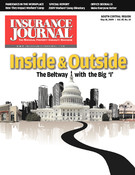Areas Where Agents Might See an Increase in Fraud
Does a bad economy increase crime? Analysts have debated that question for years, according to Mike McKee, senior special agent for the National Insurance Crime Bureau. While it’s too soon for statistics to confirm whether recent events like the mortgage meltdown and increase in unemployment truly lead consumers to commit more crimes, McKee said at least anecdotally the economic recession is affecting insurance fraud.
“The special agents at NICB have been seeing some effect from the current economic situation on insurance fraud,” McKee said. Additionally, he said the recession is affecting fraud enforcement efforts in several ways. “It’s siphoning off investigators. For example, the FBI is aligning a lot more investigators to look into actual economic fraud investigations versus insurance fraud investigations.”
The Coalition Against Insurance Fraud is seeing an uptick in different types of fraud such as auto give-ups and arson, said Howard Goldblatt, director of government affairs. “Fraud bureaus are telling us this, we’re hearing it from the state fire marshalls, and we’re hearing about it anecdotally through news stories. It’s clear that as the economy has gone down, the opportunity to commit fraud, to recover monies people think they need, has increased.”
And with anywhere from $80 billion to $200 billion lost to fraud each year, affecting all lines of the insurance business — health, property, casualty, life and disability — it’s no wonder that states are concerned with combating it.
Cars and Personal Assets
Typically, insurance fraud is more prevalent in large, metropolitan areas. Large states such as California, Florida, New York and Texas also see more than a normal amount of fraud, McKee said. Yet across the nation, from Louisiana to California, insurance departments report an increase in vehicle give-ups, where the owner alleges that a vehicle theft has taken place, but in reality the owner has gotten rid of the vehicle.
“When the owner is involved, they’ll often report the car stolen but actually take it out to the desert and set it on fire, then go back home and call the police, collect the insurance money, then pay off the car and make a profit,” McKee said.
When people are in economic straits, they also try to unload other valuable assets, such as classic cars or jewelry. New Hamp-shire’s Fraud Unit Director Barb-ara Richardson said her state’s Insurance Division has seen tons of jewelry go lost or missing in recent months.
Cindy Schmell, fraud bureau chief for the Iowa Division of Insurance, said her department has seen an increase in vehicle and home arson.
“Desperate consumers also are torching homes — seeking an insurance bailout from foreclosure or general financial distress,” McKee added.
Cargo and Copper
In the commercial insurance area, the most significant area of insurance fraud is in the rise in cargo theft from inland marine-type trucking companies, McKee said. Electronics such as laptops, video games and other equipment are being stolen off of the trucks. Semi-precious metals also are being stolen from commercial buildings, where circuit breakers are torn out and copper wiring is ripped out of the walls.
The base and semi-precious metal objects targeted are often kept in easily accessible or relatively unsecured areas, such as outdoors or at construction sites overnight, he explained.
Copper had a significantly higher number of theft claims in ISO ClaimSearch than the other metals analyzed. People are also stealing catalytic converters to remove and resell the valuable metals, McKee added. And when that happens, it destroys the vehicles.
Unreliable Agents
COIF’s Goldblatt and Ted Clark, anti-fraud division director for the Kansas Department of In-surance,reported they’ve seen an increase in agents committing premium theft and diversion.
“We know agents — unscrupulous agents — are committing fraud,” Goldblatt said. “What they tend to do is take the premium checks that are intended to go to the insurance companies and abscond with them to embezzle them, to shift them for personal use while telling the insured they are covered,” he explained.
In this case, insureds believe they have coverage, but the insurance company has no information on them, “and in some cases it only comes out after the insureds file a claim only to discover they weren’t covered,” Goldblatt said.
“As economic times get worse, some agents feel the pressure, and those that are having problems anyway, have access to people’s premium dollars,” Clark said, noting his department finds that the majority of agents are honest, but investigates a small percentage for premium theft.
“Actually a very small percentage of agents do this, but unfortunately those unscrupulous agents that do, give everyone who is an agent or a broker a bad name,” Goldblatt concluded.
Clark, Goldblatt, McKee, Richardson and Schmell were participants at the National Association of Insurance Commissioners Insurance Fraud Training Seminar held in March 2009.
Was this article valuable?
Here are more articles you may enjoy.


 AIG’s Zaffino: Outcomes From AI Use Went From ‘Aspirational’ to ‘Beyond Expectations’
AIG’s Zaffino: Outcomes From AI Use Went From ‘Aspirational’ to ‘Beyond Expectations’  Florida Engineers: Winds Under 110 mph Simply Do Not Damage Concrete Tiles
Florida Engineers: Winds Under 110 mph Simply Do Not Damage Concrete Tiles  ‘Structural Shift’ Occurring in California Surplus Lines
‘Structural Shift’ Occurring in California Surplus Lines  How One Fla. Insurance Agent Allegedly Used Another’s License to Swipe Commissions
How One Fla. Insurance Agent Allegedly Used Another’s License to Swipe Commissions 


